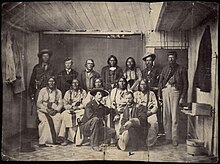Silas Soule
He was at the massacre but refused to participate and then testified and was later assassinated.
He is buried at Riverside Cemetery in Denver. And has been honored by the Arapahoe.
Silas Stillman Soule (/soʊl/ SOHL; July 26, 1838 – April 23, 1865) was an American abolitionist, a teenage 'conductor' on the Underground Railroad, military officer, and an early example of what would later be called a whistleblower. As a Kansas Jayhawker, he supported and was a proponent of John Brown's movement in the time of strife leading up to the American Civil War.
During the war, Soule joined the Colorado volunteers, and rose to the rank of captain in the Union Army. Soule was in command of 1st Colorado Cavalry, Company D that was present at Sand Creek and the massacre of Native Americans that occurred there on November 29, 1864. He testified at a U.S. military hearing that convened in February 1865 to investigate the event. Soule was murdered two months later in what some believed was retaliation.

The Sand Creek Massacre
[edit]Main article: Sand Creek massacre
On November 29, 1864, at Sand Creek, in what was then the southeastern corner of territorial Colorado, Colonel John Chivington ordered the Third Colorado Cavalry to attack Southern Cheyenne Chief Black Kettle's encampment of Southern Cheyenne.
Before the attack, Soule told other officers “any man who would take part in [such] murders, knowing the circumstances as we did, was a low lived cowardly son of a bitch.” [7] Several lieutenants also objected to Chivington's plans. Lt. Joseph Cramer and Soule went directly to Major Scott Anthony, Chivington's superior.[1]
As the attack began, Soule reminded his troops that the supposed "enemy" was a peace chief's band, and some responded that they "would not fire a shot today".[1] His company did not follow the orders given to them to enter the creek bed leading to the settlement but moved up and down the banks and observed the slaughter. There was heavy crossfire,[f] and they did not participate in the killings.
After the attack, in Chivington's telegram reporting his "victory" he condemned Soule for "saying that he thanked God he killed no Indians, and like expressions, proving himself more in sympathy with the Indians that the whites."[1]

The U.S. Congress created a congressional committee to investigate the Sand Creek Massacre due to a nationwide outrage of the incident. Soule's and others' verbal and written testimonies about the Sand Creek Massacre led to Chivington's resignation; Colorado's Second Territorial Governor, John Evans’, dismissal; and the U.S. Congress refusing the U.S. Army's repeated requests for a general war against the Plains Indians.[8]
Thank you for your contribution!
Help us reach out to more people in the community
Share this with family and friends